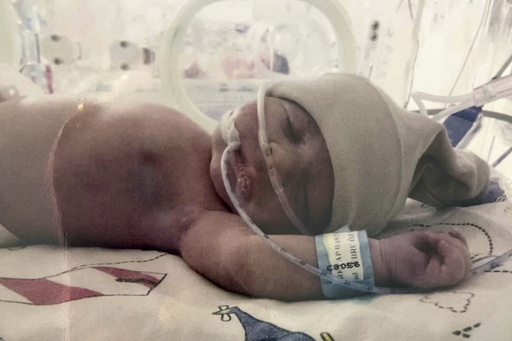
ANKARA, Turkey — When Burcu Gokdeniz gave birth to her son Umut Ali, who arrived 1.5 months premature, she was reassured by what appeared to be his good health. However, medical staff quickly took him to the neonatal intensive care unit (NICU), and that was the last time she ever saw her child alive. After a sudden decline in his condition, a doctor informed her that her son’s heart had stopped. Gokdeniz, a 32-year-old e-commerce specialist, recounted the harrowing experience of seeing her baby wrapped in a shroud just ten days after his birth, calling it the “worst moment” of her life.
Gokdeniz’s story reflects a wider outcry from numerous parents who are demanding investigations into the untimely deaths of their children. Turkish prosecutors have accused 47 medical professionals, including doctors, nurses, and ambulance drivers, of negligence in connection with the deaths of ten newborns over the span of a year. The healthcare workers maintain that they acted to the best of their ability in managing extremely vulnerable patients, yet they now face criminal consequences for the outcomes of their care.
Distrust in the healthcare system has deepened among grieving parents, leading to demonstrations in October outside hospitals linked to these incidents, where protestors even hurled stones at the buildings. The extent of the issue has led at least 350 families to file petitions for investigations with prosecutors, the Health Ministry, or the president’s office, as reported by state-run Anadolu Agency.
In pursuing justice, prosecutors are seeking an imposing sentence of up to 583 years in prison for Dr. Firat Sari, who ran NICUs in multiple Istanbul hospitals. He is facing severe charges, including organizing crime, defrauding public institutions, forgery, and negligent homicide. Evidence gathered suggests fraudulent practices aimed at generating profits, including forging patient records and prolonging unnecessary treatments in inadequately equipped facilities.
In Turkey, the right to healthcare is constitutionally guaranteed, and the public system reimburses private hospitals for treating eligible patients. The ruling party led by President Recep Tayyip Erdogan has been advocating the expansion of private healthcare access for the country’s 85 million citizens since it took power in 2002.
Ozan Eskici, who underwent fertility treatments with his wife, also experienced devastating loss after their twins were born in one of Sari’s facilities in 2019. While the babies initially seemed healthy, the girl was soon sent to intensive care and discharged after 11 days, while her brother unfortunately died after 24 days. During his interrogation, Sari refuted claims that the infants were inadequately cared for or that his units were under-qualified or understaffed. He insisted that “everything is in accordance with procedures.” This week, the Istanbul court approved the comprehensive indictment, which encompasses numerous pages of transcripts from secretly recorded conversations among the defendants, setting the trial date for November 18.
The chilling nature of this case has left the accused feeling increasingly isolated. Attorney Ali Karaoglan, along with two others representing Sari, has since withdrawn from the case. Additionally, the authorities have suspended the licenses and closed nine of the 19 hospitals implicated in the scandal, including one owned by a former health minister. The opposition leader, Ozgur Ozel, has called for a state takeover of all implicated hospitals. In response, Erdogan has affirmed that those accountable for these deaths will face strict punishment, but cautioned against blaming the entire healthcare system for a few individuals’ actions.
“We will not allow our health care community to be battered because of a few rotten apples,” he declared, characterizing the accused as “a gang of people devoid of humanity.” Erdogan pledged that justice would be served for those who exploited the system for their gain, vowing to track the issue personally to ensure that those who jeopardized innocent lives would face severe legal consequences.
Gokdeniz expressed her initial trust in Sari and accepted her son’s fate as natural until the scandal broke out, leading her to reconsider the tragic events surrounding her child’s death. “It all started to fall into place like dominoes,” she reflected. Likewise, Eskici, who had once placed unwavering faith in Sari, now interprets the doctor’s reassurances as cruel lies.
Sibel Kosal, who lost her baby Zeynep at a private hospital in 2017, is also seeking clarity. She describes how the ongoing scandal has eroded her faith in the healthcare system and perpetuated a sense of fear for her surviving children. “They have ruined a dad and a mom,” she lamented.
Kosal urged immediate action from authorities, pleading, “Don’t let babies die, don’t let mothers cry. We want a livable world, one where our children are safe.”
